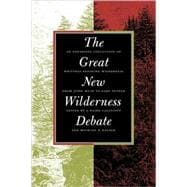
The Great New Wilderness Debate
by Callicott, J. Baird; Nelson, Michael P.Buy New
Buy Used
Rent Textbook
eTextbook
We're Sorry
Not Available
How Marketplace Works:
- This item is offered by an independent seller and not shipped from our warehouse
- Item details like edition and cover design may differ from our description; see seller's comments before ordering.
- Sellers much confirm and ship within two business days; otherwise, the order will be cancelled and refunded.
- Marketplace purchases cannot be returned to eCampus.com. Contact the seller directly for inquiries; if no response within two days, contact customer service.
- Additional shipping costs apply to Marketplace purchases. Review shipping costs at checkout.
Summary
Author Biography
Table of Contents
| Acknowledgments | |
| Introduction | p. 1 |
| Selections from "The Images or Shadows of Divine Things," "Christian Doctrine of Original Sin Defended," and "Sinners in the Hands of an Angry God" | p. 23 |
| Selections from Nature | p. 28 |
| Selections from "Walking" and "Huckleberries" | p. 31 |
| Selections from Our National Parks | p. 48 |
| "The American Wilderness: Wilderness Hunters and Wilderness Game" | p. 63 |
| "Wilderness as a Form of Land Use" | p. 75 |
| "The Problem of the Wilderness" | p. 85 |
| "Why Wilderness?" | p. 97 |
| "Wildlife Management in the National Parks" (or, The Leopold Report) | p. 103 |
| The Wilderness Act of 1964 | p. 120 |
| "Federal Wilderness Preservation in the United States: The Preservation of Wilderness?" | p. 131 |
| "An Amalgamation of Wilderness Preservation Arguments" | p. 154 |
| "Indian Wisdom" | p. 201 |
| "The International Perspective" | p. 207 |
| "Cultural Diversity, Human Subsistence, and the National Park Ideal" | p. 217 |
| "Radical American Environmentalism and Wilderness Preservation: A Third World Critique" | p. 231 |
| "The Relevance of Deep Ecology to the Third World: Some Preliminary Comments" | p. 246 |
| "Deep Ecology Revisited" | p. 271 |
| "The Third World, Wilderness, and Deep Ecology" | p. 280 |
| "Taming the Wilderness Myth" | p. 293 |
| "Overturning the Doctrine: Indigenous People and Wilderness - Being Aboriginal in the Environmental Movement" | p. 314 |
| "The Wilderness Narrative and the Cultural Logic of Capitalism" | p. 325 |
| "The Wilderness Idea Revisited: The Sustainable Development Alternative" | p. 337 |
| "The Wilderness Idea Reaffirmed" | p. 367 |
| "That Good Old-Time Wilderness Religion" | p. 387 |
| "Wilderness Areas for Real" | p. 395 |
| "Sustainability and Wilderness" | p. 408 |
| "The Pristine Myth: The Landscape of the Americas in 1492" | p. 414 |
| "The Incarceration of Wildness: Wilderness Areas as Prisons" | p. 443 |
| "The Trouble with Wilderness, or, Getting Back to the Wrong Nature" | p. 471 |
| "Wilderness, Myth, and American Character" | p. 500 |
| Selections from "Threatened Species" and "Wilderness" | p. 513 |
| "Wilderness Recovery: Thinking Big in Restoration Ecology" | p. 521 |
| "Getting Back to the Right Nature: A Reply to Cronon's 'The Trouble with Wilderness'" | p. 540 |
| "Wilderness: From Scenery to Nature" | p. 568 |
| "Should Wilderness Areas Become Biodiversity Reserves?" | p. 585 |
| "Using Biodiversity as a Justification for Nature Protection in the US" | p. 595 |
| "In Wildness Is the Preservation of the World" | p. 617 |
| "Cultural Parallax in Viewing North American Habitats" | p. 628 |
| "The Rediscovery of Turtle Island" | p. 642 |
| "Wilderness Skepticism and Wilderness Dualism" | p. 652 |
| Index | p. 691 |
| Table of Contents provided by Blackwell. All Rights Reserved. |
An electronic version of this book is available through VitalSource.
This book is viewable on PC, Mac, iPhone, iPad, iPod Touch, and most smartphones.
By purchasing, you will be able to view this book online, as well as download it, for the chosen number of days.
Digital License
You are licensing a digital product for a set duration. Durations are set forth in the product description, with "Lifetime" typically meaning five (5) years of online access and permanent download to a supported device. All licenses are non-transferable.
More details can be found here.
A downloadable version of this book is available through the eCampus Reader or compatible Adobe readers.
Applications are available on iOS, Android, PC, Mac, and Windows Mobile platforms.
Please view the compatibility matrix prior to purchase.
